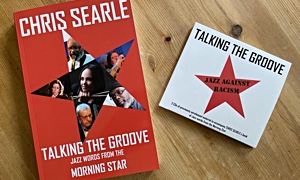Home » Jazz Articles » Book Review » Future Jazz
Future Jazz
 Howard Mandel
Howard Mandel
Oxford University Press, 1999
ISBN 0195063783
Howard Mandel's "Future Jazz" may be one of the few books to come out in recent years that addresses jazz music from the seventies to the present day. One of it's main attractions is that the author, in a series of interviews with numerous musicians of both the traditional school and the avant-garde, has given us the feeling of being witness to thoughtful conversations with the musicians, rather than lining up a series of soundbites and trying to pass it off as something real. In this case, the "something real" is woven throughout the book, revealing itself in both the thoughtful questions of the interviewer and the obviously deeply felt responses of the musicians. Mandel seems to have no fear of allowing the subjects their say, in their own words, which can sometimes go on for pages. At it's best, this method gives us insight into the motivation and concerns of the musicians, composers, and promoters of jazz in the past thirty years.
In the first chapter, under the subtitle of "Tales We Tell of Jazz in the '90's," we are given two scenarios. The first deals with Wynton Marsalis as the crown prince who arrives in New York to rescue his people's music from "anarchy and commercialism." He dresses well, attends Juilliard, is seen as an all around fine role model, and receives the blessings of his elders as well as music industry executives who reward him, and his followers, with lucrative record contracts and international tours.
In our second scenario, the author writes, "In far-flung corners of the world, orphan artists of unappreciated talent labor in obscurity to create distinct but congruent musics that reflect heights of the imagination, depths of the soul, infinite varieties of celestial melody, wond'rous harmony and earthy rhythms always known yet ever ripe for rediscovery. These savage innocents are graced with an inherent understanding of structure and tradition, but stubbornly believe they have "new ideas" and hold fast to the notion of absolute freedom. A vast conspiracy, an evil cabal, prevents them from casting their rough spells before any but the eager few who seek them out in low-rent caves, where they are paid a mere pittance."
Obviously, both of these scenarios are brought to a mythological level to make a point. But they are born of a truth, as all myths are, and throughout these pages we are drawn again and again to somebody's truth, whether we agree with it or not. In most cases, it is not even a case of agreeing or not, is a matter of hearing what each of these men and women have to say about the place the music holds in their lives, how they are motivated by it, what they hope to achieve with it, and why they make the kind of music they do.
Among the diverse voices heard here are names that most fans of jazz instantly recognize, and some that you may never have heard of. John Scofield, Michael Brecker, Marian McPartland, Hank Jones, Vernon Reid, James Newton, Geri Allen, Henry Threadgill, Wynton Marsalis and a dozen others, all have something to say about the current state of Jazz, the music's history, progress, and future. John McLaughlin tells us, "When you play music, its your life that you're talking about, that's expressing itself through music. That's why the music's very rich, because it comes from the life of the people. And there are things spoken in music that cannot be said vocally, or any other way, for that matter."Many pages later, saxophonist Joe Lovano extends that thought. "To be an honest musician, you play from your history. As your experiences grow, the music comes out. All my favorite players developed like that. Of course, we play from the history of the music around us, too. But your history, what you experience, is what really comes out if you can get deep inside yourself, the music, and the personalities of the people you play with, and don't just treat your instrument like a technical thing."
In "Future Jazz," Howard Mandel may not have provided a definitive answer to the question "What is future jazz?," but then, I don't think that was ever his intention. The questions asked, and the issues raised, have provoked enough controversy that the book has sold out it's first printing, and Oxford is expected to release a second run in the near future. Just in time to carry the discussion into the 21st century.
Read Glenn Astarita's review of the "Future Jazz" CD companion.
Comments
Tags
For the Love of Jazz
 All About Jazz has been a pillar of jazz since 1995, championing it as an art form and, more importantly, supporting the musicians who create it. Our enduring commitment has made "AAJ" one of the most culturally important websites of its kind, read by hundreds of thousands of fans, musicians and industry figures every month.
All About Jazz has been a pillar of jazz since 1995, championing it as an art form and, more importantly, supporting the musicians who create it. Our enduring commitment has made "AAJ" one of the most culturally important websites of its kind, read by hundreds of thousands of fans, musicians and industry figures every month.






















